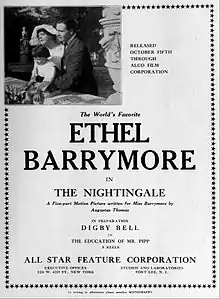The Nightingale (1914 film)
The Nightingale, drama film directed and written by Augustus Thomas in 1914, is a silent drama film, which Alco Film Corporation released. Ethel Barrymore makes her acting debut in this feature film, which Thomas wrote specifically for her. Thomas, famed as a Broadway playwright, was the best friend of Barrymore's father Maurice and had known the actress since she was a child.[1] As with many of Barrymore's films to come, the advertising for this film says the film is told in 'acts' as with a stage play, an effort to remind the audience of the star's status and preference for the legitimate stage. This film was long thought to be lost.[2][3][4][5]
| The Nightingale | |
|---|---|
 Ad for film | |
| Directed by | Augustus E. Thomas |
| Written by | Augustus Thomas |
| Produced by | All Star Feature Film Corporation |
| Starring | Ethel Barrymore |
| Distributed by | Alco Film Corporation |
Release date |
|
Running time | 5 reels |
| Country | United States |
| Language | Silent (English intertitles) |
Cast
- Ethel Barrymore as Isola Franti, 'The Nightingale'
- William Courtleigh as Tony Franti
- Frank Andrews as Andrea Franti
- Conway Tearle as Charles Marden
- Charles A. Stevenson as Nathan Narden
- Irving Brooks as 'Red' Galvin
- Mario Majeroni as David Mantz
- Philip Hahn as Jean de Resni
- Ida Darling as Mrs. Belmore
- Bobby Stewart as Nathan Marden II
- Henri Antiznat as Prefect of Police
- Frank Dudley as Frank
- M. Monet as Gazzi Catassi
- Caroline French as Maid
- Mrs. Cooper Cliffe as Nola
- Claude Cooper as Madonni
- Ed West as Police Sergeant
Production
The story of this film is similar to Clyde Fitch's 1901 play Captain Jinks of the Horse Marines, in which Barrymore became a star playing an Italian opera singer. Fitch had died in 1909, and Charles Frohman, Barrymore's theatrical employer, owned the rights to Captain Jinks. Augustus Thomas, a Barrymore family friend and author, fashioned a similar story for Barrymore, enticing her to make a film with material she was familiar with. This was common practice in the silent era to make a write-around story for popular works for which screen rights could not be obtained.
A screen version of Fitch's Captain Jinks was later made with Ann Murdock.
References
- Great Times, Good Times:The Odyssey of Maurice Barrymore, Doubleday Press, c.1977 by James Kotsilibas Davis
- The American Film Institute Catalog Feature Films: 1911-20 by The American Film Institute, c. 1988
- The Nightingale at silentera.com
- The Nightingale at the American Film Institute Catalog
- The Library of Congress American Silent Feature Film Survival Catalog:The Nightingale
External links
- The Nightingale at IMDb.com
- allmovie/synopsis(*note this film was not based on a play as AMG states, it was written especially for the star)
- Moving Picture World advertisement